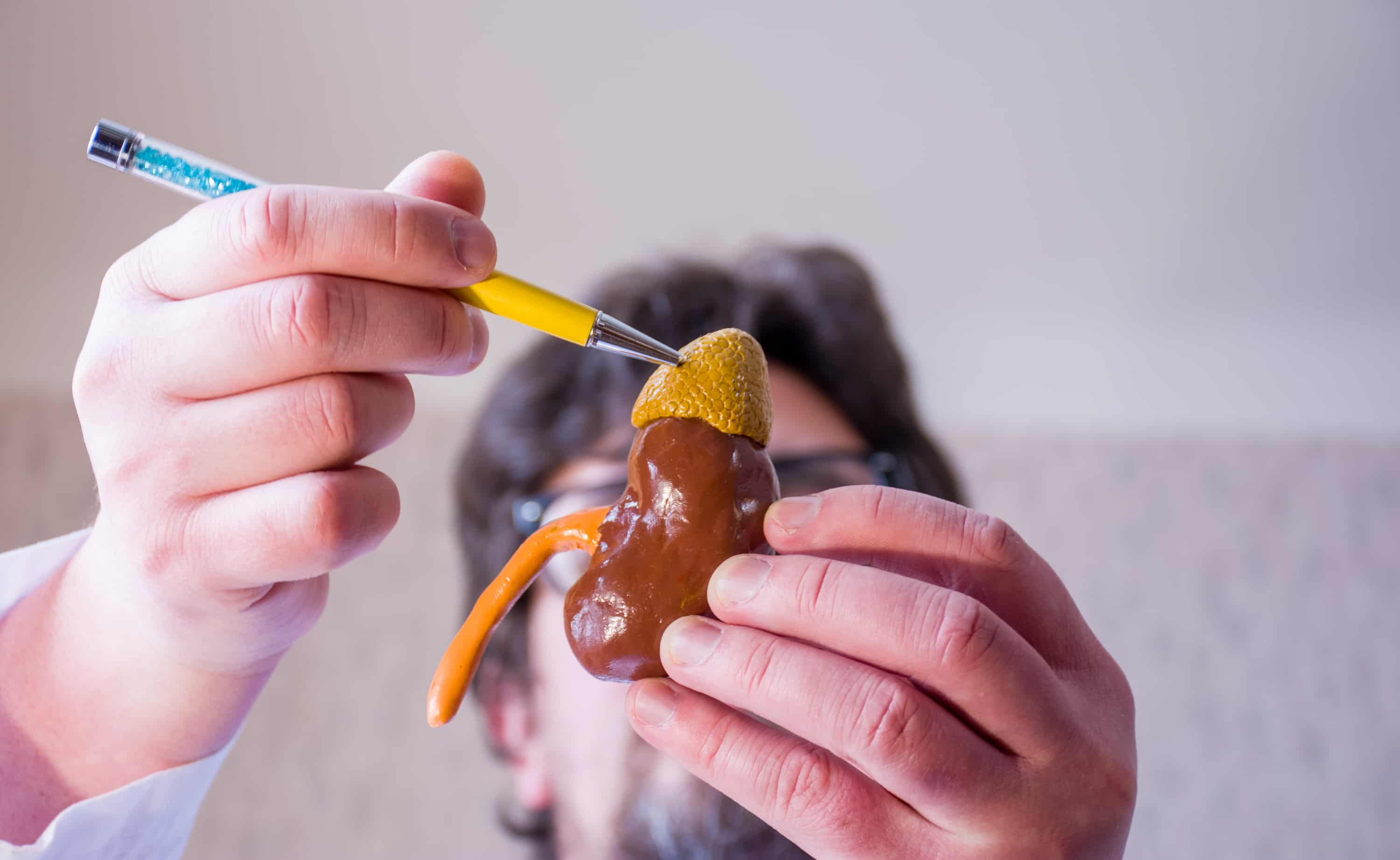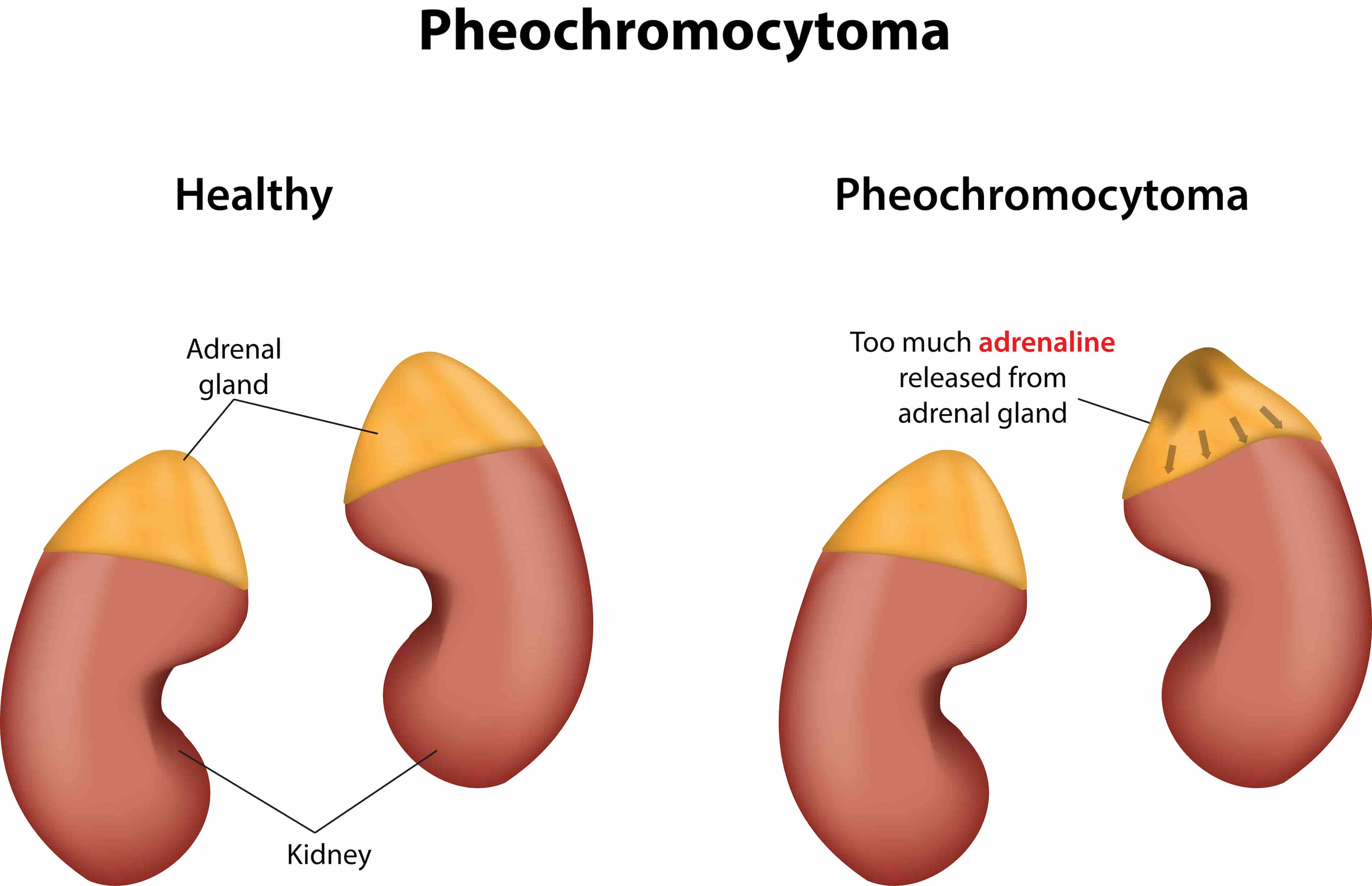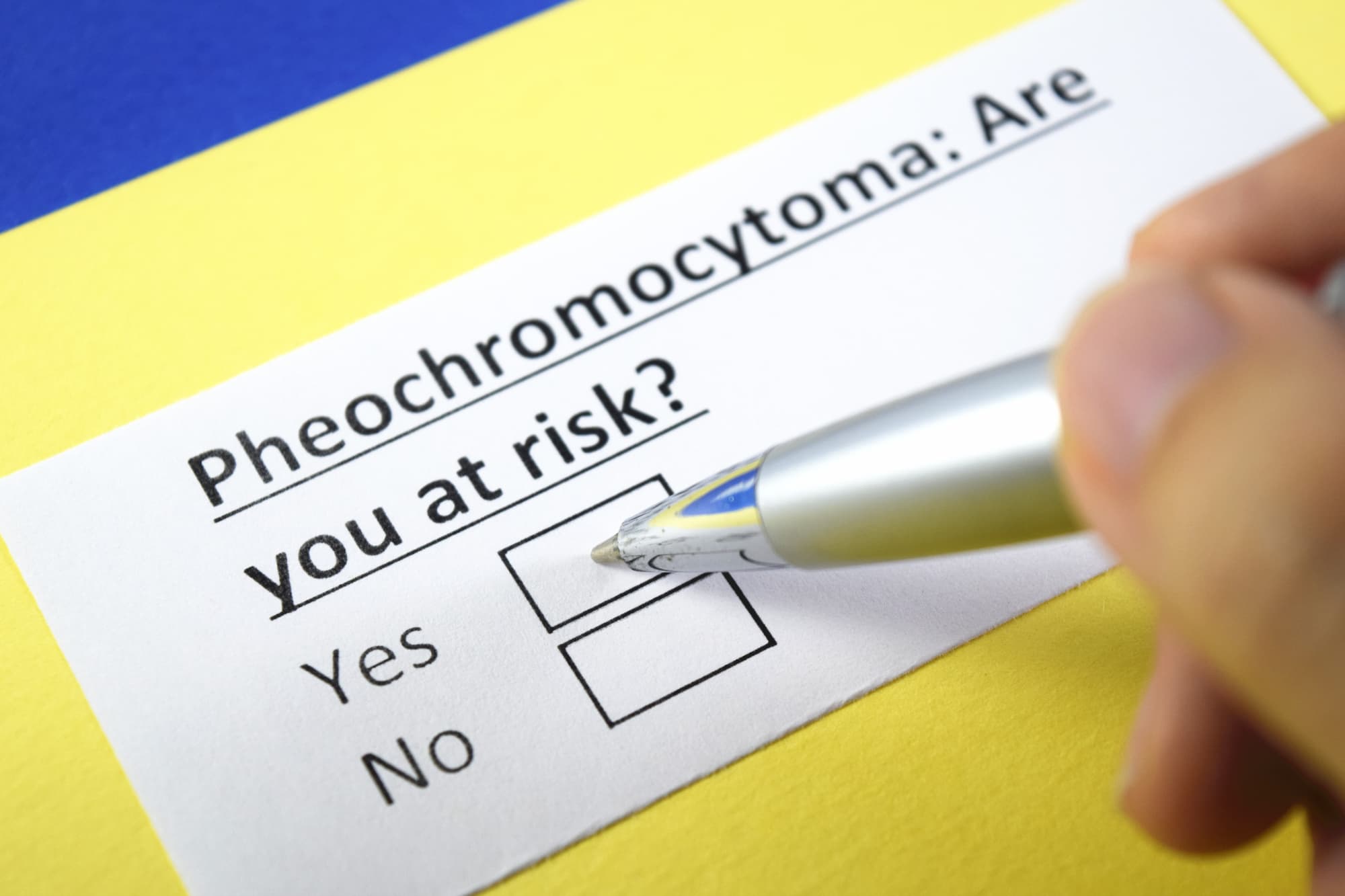Pheochromocytoma Treatment in Turkey
Healthy Türkiye helps you find the best pheochromocytoma treatment in Turkey at affordable prices and adopts a 360-degree service approach in all areas of health through affiliated hospitals.
- Medical Treatment
- Endocrinology Treatment in Turkey
- Polycystic Ovary Syndrome Treatment in Turkey
- Hypertension Treatment in Turkey
- Hyperthyroidism Treatment in Turkey
- Thyroid Disease Treatment in Turkey
- Acromegaly Treatment in Turkey
- Gigantism Treatment in Turkey
- Hirsutism Treatment in Turkey
- Hypopituitarism Treatment in Turkey
- Pediatric Endocrinology Treatment in Turkey
- Hormonal Imbalance Treatment in Turkey
- Pituitary Tumor Treatment in Turkey
- Hypothyroidism Treatment in Turkey
- Pheochromocytoma Treatment in Turkey
- Homepage
- Medical Treatment
- Pheochromocytoma Treatment in Turkey

About Pheochromocytoma Treatment in Turkey
If detected early, pheochromocytoma treatment in Turkey can be successfully managed in the vast majority of cases. If possible, the treatment of choice for the condition is surgery to remove the tumors, but there are other treatment alternatives. Surgical pheochromocytoma treatment in Turkey often returns blood pressure to normal and alleviates symptoms. Once diagnosed, it is suggested to be seen by a multi-disciplinary medical team with pheo experience.
A pheochromocytoma is a rare, generally slow-growing, neuroendocrine tumor that develops in cells in the center of an adrenal gland called the adrenal medulla. These two adrenal glands, one above each kidney, produce hormones that give instructions to virtually all organs and tissue in the body. The adrenal medulla controls hormones that activate the flight or fight response.
Pheochromocytoma produces an excess amount of catecholamine hormone, which includes norepinephrine (noradrenaline), epinephrine (adrenaline), and dopamine. The release of catecholamines can cause persistent/episodic high blood pressure, headache, sweating, and other symptoms. If left uncured, a pheochromocytoma can result in severe damage to other body systems, especially the cardiovascular system. 30-40% of pheochromocytomas and paragangliomas are hereditary.
Mostly, pheochromocytomas are in the adrenal medulla (about 90%). Pheochromocytomas may also be found in other tissues derived from neural crest cells. Pheochromocytomas vary in size but average 5-6 cm in diameter and weigh 50 to 200 g Rarely, they are large enough to be palpated or cause symptoms due to pressure or obstruction.
Turkey is an international leader in endocrinology care. As Healthy Türkiye, we provide comprehensive consultations, evaluations, and treatments for a wide range of adrenal hormone conditions, such as pheochromocytoma treatment in Turkey.

Pheochromocytoma Treatment Procedure in Turkey
A pheochromocytoma is a rare, generally benign tumor that develops in an adrenal gland. Usually, a pheochromocytoma develops in only one adrenal gland, but tumors can develop in both. Pheochromocytoma is a rare endocrine tumor that can present insidiously and remain undiagnosed until death or the onset of clear manifestations of catecholamine excess. It is often referred to as one of the ‘great mimics’ in medicine.
This tumor can no longer be regarded as a uniform disease entity, but rather as a highly heterogeneous group of chromaffin cell neoplasms with different ages of onset, secretory profiles, locations, and potential for malignancy according to underlying genetic mutations. If you have a pheochromocytoma, the tumor releases several hormones that may cause high blood pressure, headache, sweating, and symptoms of a panic attack. If a pheochromocytoma isn’t cured, severe or life-threatening damage to other body systems can result.
Pheochromocytomas in the adrenal medulla develop equally in both sexes, are bilateral in 10% of cases (20% in children), and are malignant in < 10%. Also, of extra-adrenal tumors, known as paragangliomas, 30% are malignant. Although pheochromocytomas develop at any age, the peak incidence is between the 20s and 40s. Almost 50% are thought to be due to germline mutations.
Diagnosis for Pheochromocytoma Treatment in Turkey
Usually, over 50% are pheochromocytomas are found incidentally, when an imaging scan reveals a mass in the adrenal gland. If a pheochromocytoma is suspected due to symptoms like high blood pressure, your health provider will take your medical history and do a physical examination, also taking a family history is very important. Besides, your doctor will likely order lab tests and imaging scans.
Laboratory Tests for Pheochromocytoma Treatment in Turkey
Most pheochromocytomas secrete catecholamines that can be measured in blood and urine. Tests include:
Blood tests: In people who are at a higher risk for having a pheochromocytoma disease, blood testing for catecholamines is done first. This test is more sensitive than a urine test, but also more likely to result in false-positive results.
Urine analysis: In those who do not have a genetic syndrome the test of choice is urine catecholamines. This is less sensitive, but also less likely to give false-positive readings. Urine is collected each time a person urinates for 24 hours and after, evaluated in the lab.
Imaging for Pheochromocytoma Treatment in Turkey
After a biochemical diagnosis has been made with blood tests, imaging analyses are done to locate the tumor. Tests might include:
CT scan: A CT scan combines many X-ray pictures to create a 3-dimensional view of the organs and other soft tissue in a specific region of the body. CT scan can be considered the best test to locate a pheochromocytoma.
MRI: An MRI may be somewhat less accurate than a CT but may be chosen in children and young adults to reduce radiation exposure.
Scintigraphy (MIBG scan): Most of the time a pheochromocytoma can be located with a CT scan or MRI. If a tumor is not seen but is strongly suspected, this nuclear imaging study may be done. In this scan method, a small amount of radioactive material is injected into a vein where it is taken up by neuroendocrine cells such as those in a pheochromocytoma. A camera that can detect radioactivity is then used to see if a tumor is current in the adrenal gland. MIBG scan may also be done if a tumor is suspected to be metastatic (if it has spread, or metastasized).
Causes of Pheochromocytoma
Pheochromocytomas’s reason can be a component of certain familial or genetic syndromes. The most common familial condition is called multiple endocrine neoplasias, it is MEN for short. Two types of MEN that are MEN 2A and 2B, are associated with pheochromocytomas. Both are genetic syndromes that run in families and are transmitted from parent to child in an autosomal dominant form.
Pheochromocytomas are also a feature of other genetic disorders, including von Hippel-Lindau syndrome and neurofibromatosis type 1. Both of these disorders are associated with the growth of numerous benign and malignant tumors. There are also many individuals who have pheochromocytomas with no known family history of them and these cases are termed sporadic. In general, if these patients have bilateral disease (pheochromocytomas in both adrenal glands) or are diagnosed before the age of 21, genetic screening is suggested.
Apart from all this, anything that can cause overactivity of the sympathetic nervous system can be on the list of diagnoses to rule out when suspecting a pheochromocytoma. The sympathetic system is the main control panel governing the release of the “flight or fight” response in response to stress or fear. Things that can stimulate this include drugs; withdrawal from drugs (such as suddenly stopping certain blood pressure medications); panic attacks, and spinal cord injuries are among the many conditions that can also lead to some of the signs seen in pheochromocytomas.

We Care About Your Health
Healthy Türkiye provides the best for your health and comfort. You will feel privileged with us.
7/24 Quality Personal Assistance Throughout Your Journey
Customizable for You All-Inclusive Packages
Get the Right Advice for your Health
Types of Pheochromocytoma Treatment in Turkey
Pheochromocytoma treatment options depend on several factors, including if the tumor produces catecholamines, its location if it is cancerous and the stage, possible side effects, and the patient’s preferences and overall health. You should talk with your doctor about the aims of each treatment and what you can expect while receiving the treatment. Shared decision-making is when you and your doctors work together to choose treatments that fit the aims of your care. Shared decision-making is particularly important for pheochromocytoma because there are different treatment options.
The common types of treatments used for pheochromocytoma are described below. Your care plan also includes treatment for symptoms, an important part of medical care.
Treatments to control hormone levels
Surgery
Radiation therapy
Targeted therapy
Control hormone levels: When pheochromocytoma is diagnosed, usually the first treatment is intended to control hormones and lower blood pressure. These treatments should normally be given for several days or weeks before surgery.
If a tumor is making catecholamines, the doctor will prescribe medication to help control the symptoms they cause. Alpha-adrenergic blockers like phenoxybenzamine (Dibenzyline), are commonly used to lower blood pressure. Beta-blockers like propranolol may be used to control a fast or irregular pulse. Beta-blockers should be used with notice and under the direction of an expert in endocrinology, which is the area of medicine focusing on the body’s hormone system.
Certain treatments may cause dangerous levels of catecholamines to be released, so patients may be given a combination of hormone-blocking drugs before and during these treatments. This type of drug therapy is continued after other treatments if catecholamine-related symptoms are still occurring.
Surgical Pheochromocytoma Treatment in Turkey
If it is possible, completely removing the entire tumor is the standard first treatment. Most localized pheochromocytomas are successfully treated with surgery alone, the surgeon will remove some tissue surrounding the tumor, called a margin, in hopes of leaving no traces of cancer in the body.
Laparoscopic surgery may be performed for a pheochromocytoma unless the tumor is very large. Laparoscopic surgery is a less invasive type of surgery that uses 3-4 small incisions instead of 1 large incision. A thin, lighted tube is attached to a video camera and is inserted through an opening to guide the surgeon. For pheochromocytoma, one or both adrenal glands, or part of a gland, may be removed.
When completely removing a tumor is not possible, debulking surgery can be sometimes recommended. Debulking surgery removes as much of the tumor as possible and can supply some relief from symptoms, but it generally does not provide a cure. If cancer has spread to other organs, those organs can also be removed using surgery.
If removing the tumor by surgery is not possible, it is called an “inoperable tumor” and in these situations, the doctor will recommend another type of treatment.
Additional Pheochromocytoma Treatments in Turkey
Radiopharmaceuticals: A radiopharmaceutical is usually suggested first for people with metastatic tumors. In this therapy method, a radioactive substance that accumulates in pheochromocytoma tumor cells is injected into a vein. It then travels to the tumor, and when taken up by the tumor cells, it gives off radiation that causes the cells to disappear.
Chemotherapy: For tumors that are growing rapidly, this therapy method, using a combination of several medications designed to kill cancer cells, is often used. These drugs may be given orally by pill, or by intravenous (IV, within a vein) infusion.
Targeted therapies: Targeted therapies are medications that specifically target cancer cells or a pathway involved in their growth. Oncologists have had success using the drug Sutent in people with pheochromocytoma.
Immunotherapy: Immunotherapy is a medication that uses the immune system or principles of the immune system to treat tumors. Studies have found that the immunotherapy drugs (in combination with a targeted therapy) helped to slow or stop the progression (growth) of a metastatic pheochromocytoma, extending patients’ life expectancy.
Treatment By Stage of Pheochromocytoma
Different treatments may be recommended for each stage of pheochromocytoma. Your doctor will work with you to develop a specific treatment plan based on your specific diagnosis and conditions. Clinical trials can also be a treatment option for each stage.
Localized pheochromocytoma: Localized pheochromocytoma is often treated with surgery to remove the tumor. If the tumor is in an adrenal gland, then the whole gland can be removed.
Regional pheochromocytoma: Regional pheochromocytoma has spread to nearby organs or lymph nodes. Surgery will be used to remove the tumor and if nearby organs are affected, then those organs may also have to be removed with surgery.
Metastatic pheochromocytoma: If a cancerous pheochromocytoma spreads to another part of the body from where it started, doctors call it metastatic cancer. If this happens, it is a good idea to talk with doctors who have experience in treating it because doctors can have different opinions about the best standard treatment plan. Clinical trials may also be an option.

2026 Cost of Pheochromocytoma Treatment in Turkey
All types of medical attention like pheochromocytoma treatment are very affordable in Turkey. Many factors are also included in determining the cost of pheochromocytoma treatment in Turkey. Your process with Healthy Türkiye will last from the time you decide to have a pheochromocytoma treatment in Turkey until the time you are fully recovered even if you are back home. The exact pheochromocytoma treatment procedure cost in Turkey depends on the type of operation involved.
The cost of pheochromocytoma treatment in Turkey does not demonstrate many variations in 2026. Compared to costs in developed countries like the United States or the UK, pheochromocytoma treatment costs in Turkey are relatively low. So, it’s no wonder patients from across the world visit Turkey for pheochromocytoma treatment procedures. However, the price is not the only factor affecting choices. We suggest looking for hospitals that are safe and have pheochromocytoma treatment reviews on Google. When people decide to seek medical help for pheochromocytoma treatment, they will not only have low-cost procedures in Turkey, but also the safest and best treatment.
At clinics or hospitals contracted with Healthy Türkiye, patients will receive the best pheochromocytoma treatment from specialist doctors in Turkey at affordable rates. Healthy Türkiye teams to provide medical attention to pheochromocytoma treatment procedures and high-quality treatment to patients at a minimum cost. When you contact Healthy Türkiye assistants, you can get free information about the cost of pheochromocytoma treatment in Turkey and what this cost covers.
Why Is Pheochromocytoma Treatment Cheaper in Turkey?
One of the main considerations before traveling abroad for pheochromocytoma treatment is the cost-effectiveness of the whole process. Many patients think that when they add flight tickets and hotel expenses to their pheochromocytoma treatment costs, it will become very expensive to travel, which is not true. Contrary to popular belief, round-trip flight tickets to Turkey for pheochromocytoma treatment can be booked very affordably.
In this case, assuming you are staying in Turkey for your pheochromocytoma treatment, your total travel expense of flight tickets and accommodation will only cost less than any other developed country, which is nothing compared to the amount that you are saving. The question “why is pheochromocytoma treatment cheaper in Turkey?” is so common between patients or people simply curious about getting their medical treatment in Turkey. When it comes to pheochromocytoma treatment prices in Turkey, there are 3 factors that allow cheaper prices:
The currency exchange is favorable for whoever looking for pheochromocytoma treatment has a euro, dollar, or pound;
The lower cost of living and cheaper overall medical expenses such as pheochromocytoma treatment;
For pheochromocytoma treatment, incentives are given by the Turkish Government to medical clinics working with international clients;
All these factors allow for cheaper pheochromocytoma treatment prices, but let’s be clear, these prices are cheaper for people with strong currencies (as we said, euro, dollar, Canadian dollar, pound, etc).
Every year, thousands of patients from all over the world come to Turkey to get pheochromocytoma treatment. The success of the healthcare system has increased in recent years, especially for pheochromocytoma treatment. It’s easy to find well-educated and English-speaking medical professionals in Turkey for all kinds of medical treatment such as pheochromocytoma treatment.

Why Choose Turkey for Pheochromocytoma Treatment?
Turkey is a common choice among international patients seeking advanced pheochromocytoma treatment. Turkey’s health procedures are safe and effective operations with a high success rate like pheochromocytoma treatment. The increasing demand for high-quality pheochromocytoma treatment at affordable prices has made Turkey a popular medical travel destination. In Turkey, pheochromocytoma treatment is performed by highly experienced and trained doctors with the most advanced technology in the world. pheochromocytoma treatment is done in Istanbul, Ankara, Antalya, and other major cities. The reasons for choosing pheochromocytoma treatment in Turkey are as follows:
High-quality hospitals: Joint Commission International (JCI) accredited hospitals have dedicated pheochromocytoma treatment units that are specially designed for patients. International and national strict protocols provide effective and successful pheochromocytoma treatment for patients in Turkey.
Qualified experts: The expert teams include nurses and specialist doctors, together to carry out pheochromocytoma treatment according to the patient’s needs. All the included doctors are highly experienced in performing pheochromocytoma treatment.
Affordable price: The cost of pheochromocytoma treatment in Turkey is affordable compared to Europe, the USA, the UK, Singapore, Australia, etc.
The high success rate: Highly experienced specialists, the best available technology, and stringently followed safety guidelines for post-operative care of the patient, resulting in a high success rate for pheochromocytoma treatment in Turkey.
Is Pheochromocytoma Treatment Safe in Turkey?
Did you know Turkey is one of the most visited destinations for pheochromocytoma treatment in the world? It is ranked one of the most visited tourist destinations for pheochromocytoma treatment. Over the years it has also come to be a very popular medical tourism destination too with many tourists coming in for pheochromocytoma treatment. There are so many reasons why Turkey stands out as a leading destination for pheochromocytoma treatment. Because Turkey is both safe and easy to travel to too with a regional airport hub and flight connections to pretty much everywhere, it is preferred for pheochromocytoma treatment.
The best hospitals in Turkey have experienced medical staff and specialists who have performed thousands of medical services such as pheochromocytoma treatment. All procedures and coordination related to pheochromocytoma treatment are controlled by the Ministry of Health in accordance with the law. Over many years, the greatest progress in medicine has been observed in the field of pheochromocytoma treatment. Turkey is known among foreign patients for its great opportunities in the area of pheochromocytoma treatment.
To emphasize, besides the price itself, the key factor in selecting a destination for pheochromocytoma treatment is certainly the standard of medical services, the hospital staff’s high expertise, hospitality, and the safety of the country.
All-Inclusive Package for Pheochromocytoma Treatment in Turkey
Healthy Türkiye offers all-inclusive packages for pheochromocytoma treatment in Turkey at much lower prices. Extremely professional and experienced doctors and technicians carry out high-quality pheochromocytoma treatment. The cost of pheochromocytoma treatment in European countries can be quite expensive, especially in the UK. Healthy Türkiye provides cheap all-inclusive packages for a long and short stay of pheochromocytoma treatment in Turkey. Because of many factors, we can provide you with many opportunities for your pheochromocytoma treatment in Turkey.
The price of pheochromocytoma treatment differs from other countries due to medical fees, staff labor prices, exchange rates, and market competition. You can save much more in pheochromocytoma treatment compared to other countries in Turkey. When you purchase a pheochromocytoma treatment all-inclusive package with Healthy Türkiye our healthcare team will present hotels for you to choose from. In pheochromocytoma treatment travel, you will have the price of your stay included in the all-inclusive package cost.
In Turkey, when you purchase pheochromocytoma treatment all-inclusive packages through Healthy Türkiye, you will always receive VIP transfers. These are provided by Healthy Türkiye, which is contracted with highly qualified hospitals for pheochromocytoma treatment in Turkey. Healthy Türkiye teams will organize everything about pheochromocytoma treatment for you and have you picked up from the airport and safely brought to your accommodation.
Once settled in the hotel, you will be transferred to and from the clinic or hospital for pheochromocytoma treatment. After your pheochromocytoma treatment has been successfully completed, the transfer team will return you to the airport in time for your flight home. In Turkey, all packages of pheochromocytoma treatment can be arranged upon request, which relaxes the minds of our patients. You can reach out Healthy Türkiye for everything you need to know about pheochromocytoma treatment in Turkey.
The Best Hospitals in Turkey for Pheochromocytoma Treatment
The best hospitals in Turkey for pheochromocytoma treatment are Healthy Türkiye, Memorial Hospital, Acıbadem International Hospital, and Medicalpark Hospital. These hospitals attract patients from all over the world seeking pheochromocytoma treatment due to their affordable prices and high success rates.
Best Doctors and Surgeons in Turkey for Pheochromocytoma Treatment
The best doctors and surgeons in Turkey for pheochromocytoma treatment are highly skilled professionals who offer specialized care and advanced procedures. With their expertise and state-of-the-art techniques, these specialists ensure that patients receive high-quality pheochromocytoma treatment and achieve optimal health results.

Frequently Asked Questions
Patients with a small pheochromocytoma that has not spread to other areas of the body have a 5-year survival rate of about 95%. Patients with pheochromocytoma that has grown back (recurred) or spread to other areas of the body have a 5-year survival rate between 34% and 60%.
The leading catecholamine-related symptom for clinicians to suspect pheochromocytoma is hypertension. Related to hypertension, 4 patterns of blood pressure are seen: sustained hypertension, paroxysmal hypertension, sustained hypertension with paroxysms, and normotension.
Blood tests are available for metanephrine, normetanephrine, and chromogranin, the most commonly ordered blood test for pheochromocytoma is the plasma-free metanephrine test.
Due to the “rule of 10”, in 1/10 patients with pheochromocytoma, it is malignant, in 1/10 of cases the tumor is bilateral, in 1/10 extra-adrenal, and in 1/10 familial. Surgery, the only curative treatment, carries a high risk of hypertensive crises due to massive catecholamine release.
Drugs known to provoke a pheochromocytoma paroxysm (eg, beta-adrenergic blocker in absence of alpha-adrenergic blockade, glucagon, histamine, metoclopramide, high-dose corticosteroids) should be avoided.
Considering that not all effects of COVID-19 on the human body are known yet, the simultaneous presence of COVID-19 and pheochromocytoma in a person who didn’t have any specific symptoms so far may indicate that COVID-19 has triggered pheochromocytoma.
